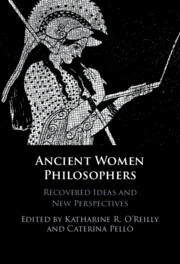Book contents
- Ancient Women Philosophers
- Ancient Women Philosophers
- Copyright page
- Dedication
- Contents
- Contributors
- Acknowledgements
- Abbreviations
- Introduction
- Chapter 1 Beyond Gender
- Chapter 2 Sulabhā and Indian Philosophy
- Chapter 3 Women’s Medical Knowledge in Antiquity
- Chapter 4 Ancient Women Epicureans and Their Anti-Hedonist Critics
- Chapter 5 Arete of Cyrene and the Role of Women in Philosophical Lineage
- Chapter 6 Women at the Crossroads
- Chapter 7 Pythagorean Women and the Domestic as a Philosophical Topic
- Chapter 8 Perictione, Mother of Metaphysics
- Chapter 9 Not Veiled in Silence
- Chapter 10 Women Philosophers and Ideals of Being a Woman in Neoplatonic Schools of Late Antiquity
- Chapter 11 Reappraising Ban Zhao
- Chapter 12 The Reception of Plato on Women
- References
- Index
Chapter 10 - Women Philosophers and Ideals of Being a Woman in Neoplatonic Schools of Late Antiquity
The Examples of Sosipatra of Ephesus and Hypatia of Alexandria
Published online by Cambridge University Press: 17 August 2023
- Ancient Women Philosophers
- Ancient Women Philosophers
- Copyright page
- Dedication
- Contents
- Contributors
- Acknowledgements
- Abbreviations
- Introduction
- Chapter 1 Beyond Gender
- Chapter 2 Sulabhā and Indian Philosophy
- Chapter 3 Women’s Medical Knowledge in Antiquity
- Chapter 4 Ancient Women Epicureans and Their Anti-Hedonist Critics
- Chapter 5 Arete of Cyrene and the Role of Women in Philosophical Lineage
- Chapter 6 Women at the Crossroads
- Chapter 7 Pythagorean Women and the Domestic as a Philosophical Topic
- Chapter 8 Perictione, Mother of Metaphysics
- Chapter 9 Not Veiled in Silence
- Chapter 10 Women Philosophers and Ideals of Being a Woman in Neoplatonic Schools of Late Antiquity
- Chapter 11 Reappraising Ban Zhao
- Chapter 12 The Reception of Plato on Women
- References
- Index
Summary
Sosipatra of Ephesus and Hypatia of Alexandria are the most prominent female philosophers and teachers of the Neoplatonic schools of late antiquity. However, none of their philosophical writings were passed down to us, so that – in recovering their thoughts – we depend on letters written to them and texts written about them. In these sources, Sosipatra and Hypatia appear to us as some kind of schisms, that is as historical figures on the one hand and as literary characters on the other hand, used by other authors to express their views on the philosophical life and the ideal way of living as a woman. This chapter will do justice to both aspects, unpacking what the sources allow us to conclude about the philosophical teaching of the historical Sospiatra and Hypatia and discussing how both characters are used by other Neoplatonists to convey certain ideals of femaleness.
- Type
- Chapter
- Information
- Ancient Women PhilosophersRecovered Ideas and New Perspectives, pp. 190 - 208Publisher: Cambridge University PressPrint publication year: 2023



